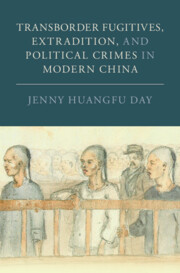Refine search
Actions for selected content:
4 results

Transborder Fugitives, Extradition, and Political Crimes in Modern China
-
- Published online:
- 10 November 2025
- Print publication:
- 30 October 2025
3 - The Debate over Judicial Torture and the Failure of Extradition
-
- Book:
- Transborder Fugitives, Extradition, and Political Crimes in Modern China
- Published online:
- 10 November 2025
- Print publication:
- 30 October 2025, pp 56-86
-
- Chapter
- Export citation
2 - The Origin of the “Political Offense Exception” in Sino-British Extradition
-
- Book:
- Transborder Fugitives, Extradition, and Political Crimes in Modern China
- Published online:
- 10 November 2025
- Print publication:
- 30 October 2025, pp 31-55
-
- Chapter
- Export citation
1 - Introduction
-
- Book:
- Transborder Fugitives, Extradition, and Political Crimes in Modern China
- Published online:
- 10 November 2025
- Print publication:
- 30 October 2025, pp 1-30
-
- Chapter
- Export citation
